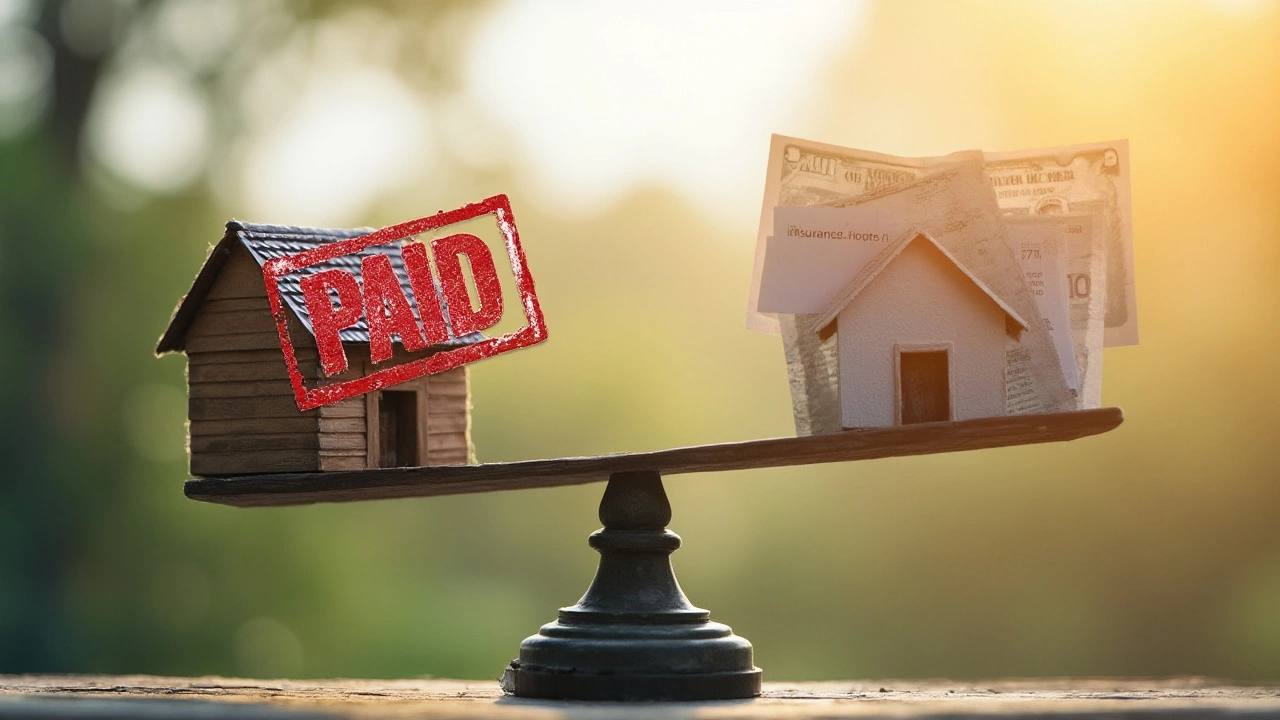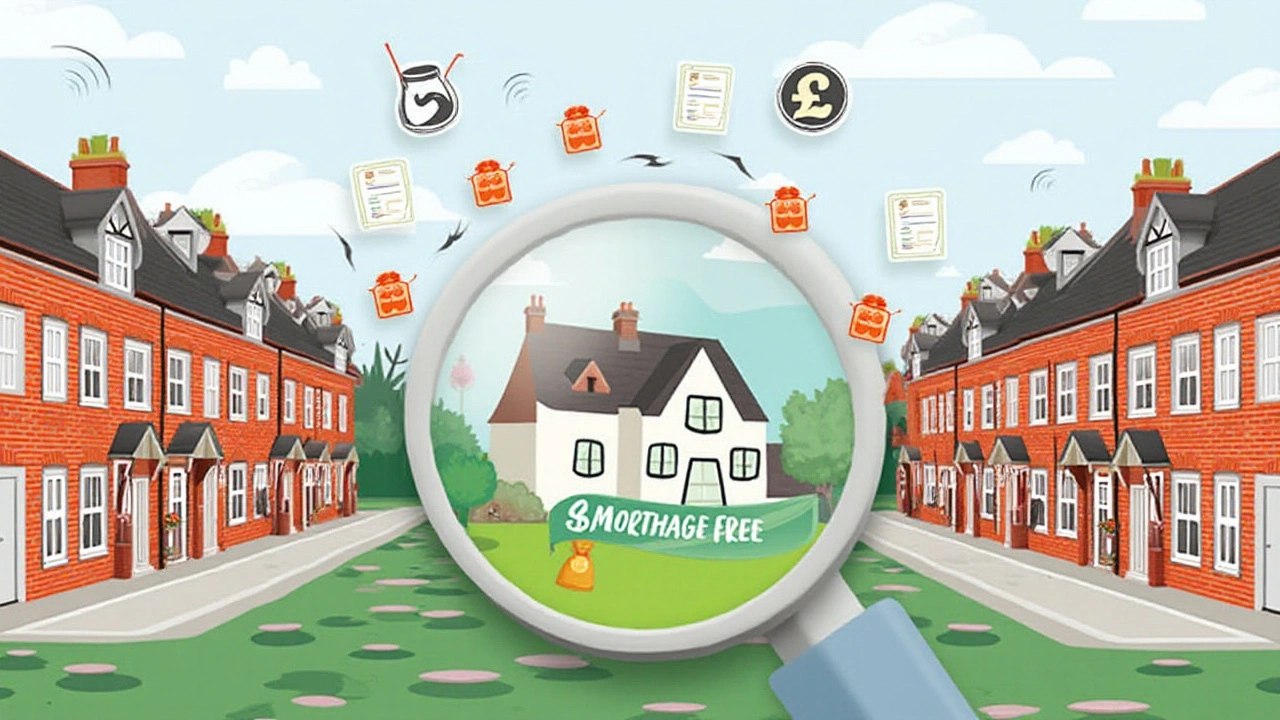Achieving the milestone of paying off your mortgage can feel like a breath of fresh air, liberating you from monthly payments and opening new financial avenues. A common question many homeowners face at this point is whether this accomplishment has any impact on their home insurance rates. Though clearing your mortgage is a significant financial step, it doesn't directly alter the insurance premiums on your home.
However, this newfound financial freedom can open doors to explore other ways of potentially reducing these costs. While the direct link between having a mortgage and home insurance premiums may not be straightforward, understanding the interplay between various factors can empower you to make savvy decisions. Let's navigate through the nuances of this topic to reveal practical insights for the financially conscious homeowner.
- Understanding Home Insurance Basics
- Mortgage Influence on Insurance Costs
- Benefits of Paying Off Your Mortgage
- Strategizing Insurance Premium Reduction
- Taking Advantage of Financial Freedom
Understanding Home Insurance Basics
Home insurance, a fundamental aspect of homeownership, acts as a safety net against potential risks that can impact your home. At its core, it provides protection against damages or losses caused by events such as fires, theft, or natural disasters. Many policies also extend to coverage for personal belongings and liability protection, should someone be injured on your property. The premiums you pay for this insurance are determined by various factors, including the value of your home, its location, and the extent of coverage you choose.
Knowing the different components that make up your home insurance can be invaluable. Typically, a standard policy includes property protection, which covers the physical structure, and personal property coverage, which safeguards your belongings. A lesser-known aspect is loss of use coverage, reimbursing you for additional living expenses if your home becomes uninhabitable due to insured damages. Moreover, liability coverage offers protection against legal incidents involving others on your property.
Did you know that home insurance policies can vary widely depending on your location and the risks prevalent there? For instance, homes in bushfire-prone areas around Australia may have different coverage needs compared to those in urban settings. This difference is crucial when choosing the right policy tailored to your specific circumstances. Insurance providers take into account a multitude of variables, both environmental and personal, to ascertain the risk level and consequently set your insurance rates.
Types of Home Insurance Policies
There are predominantly three types of home insurance policies to consider: Basic, Broad, and Special. The basic policy, although cost-efficient, covers only named perils, while broad provides more comprehensive coverage with a balanced premium. The special type is the most extensive, offering protection against all risks except those explicitly excluded. Selecting the right policy involves a careful evaluation of what you need and understanding what each policy offers.
"Investing time to understand the specifics of your home insurance policy can result in substantial benefits," says Linda Collins, an expert from the Australian Institute of Insurance and Finance. "It empowers you as a homeowner to make choices that best protect your home and financial well-being."
It's imperative for homeowners to regularly review their insurance policies ensuring adequate coverage as life circumstances change. This proactive approach can prevent unforeseen financial burdens in the event of a claim. Often, revisiting your policy during life events such as renovations or new purchases can be a prudent step. Remember, insurance isn't merely a product—it's peace of mind for your most significant investment.
Mortgage Influence on Insurance Costs
It might surprise some homeowners to learn that having a mortgage doesn't directly make home insurance more expensive. Instead, lenders often require that you have an active insurance policy as a condition of the loan, which differs substantially from affecting the cost of the coverage itself. The primary goal of a lender-mandated insurance policy is to safeguard the investment, ensuring that if disaster strikes, the value of the home remains intact. This safeguard does not inherently tie into the premium costs associated with owning a property outright or under a mortgage.
Once the home loan is paid off, the requirement to hold a specific type of policy evaporates. With the shackles of a mandatory insurance plan lifted, homeowners are free to shop around for more cost-effective options if they so choose. However, paying off your mortgage does not mean automatic savings on insurance premiums. In fact, insurance costs can remain stable unless active measures are taken to renegotiate or switch providers.
To illustrate, a 2023 study analyzed fluctuations in insurance premiums post-mortgage payoff and revealed that while there was no direct impact, many homeowners cited increased flexibility in choosing plans that better fit their actual needs. The path to reducing premiums typically involves more personalized approaches rather than mere mortgage status updates. Factors like age of the home, materials used in construction, and community risk all hold weight in influencing how much one pays.
"The freedom of choice can lead to more informed selections," says industry expert Jane Thompson. "But the payoff doesn't automatically trim costs. Education and negotiation are key in reaping financial benefits post-mortgage."
Interestingly, some insurers offer discounts to promote modernization and efficiency. Implementing safety features such as burglar alarms, smoke detectors, and reinforced windows can potentially sway premiums. Take for instance the case of Linda from Brisbane, who managed to lower her costs significantly by adding storm shutters after clearing her loan. Proactive measures such as these emphasize control and can be a strategic response to achieving more tailored financial freedom.
Staying informed and diligently reviewing your insurance requirements periodically can yield long-term benefits. Tracking changes in market rates and understanding your property's specific risks ensures that you're neither underinsured nor overpaying for protection. It's a complex dance between caution and cost-efficiency, one which can put significant savings back in your pocket, or at least deliver peace of mind in knowing that your most valuable asset is well-protected.

Benefits of Paying Off Your Mortgage
Reaching the milestone of paying off your mortgage is not just an emotional victory, it can also lead to a profound transformation in your financial landscape. When you rid yourself of that mortgage burden, you're essentially releasing a stable cash flow monthly into your household. This surplus can be redirected into savings, investments, or even a long-planned vacation. Financial advisers often highlight the freedom from debt as a way to stabilize your future finances, providing a safety net that many only dream about.
In addition to improving cash flow, paying off your mortgage can significantly impact your credit score. Without the weight of a monthly mortgage payment on your credit profile, it can lead to an increase in your credit score over time. This improved credit score not only brings peace of mind but can also present better opportunities for financing or line of credit applications. It's a solid step towards a healthier and more credible financial portrait, allowing for swifter approvals and better interest rates for any future endeavors.
The emotional satisfaction and mental peace that come with a zero-mortgage balance should not be understated, either. It's a seasoned notion that reducing financial stressors can lead to a sweeter quality of life. Not having to worry about the next month's hefty payment can free your mind to think positively about future possibilities.
Kristin Wong of The New York Times mentions, "A mortgage-free life means having more freedom to take risks that were previously held back by financial obligations."It's an opportunity to reallocate your resourceful energy elsewhere.
Additionally, paying off your mortgage means more equity in your home, giving you the flexibility to make changes or improvements without needing permission from a lender. This sense of ownership turns dreams of home expansions or renovations into reality, enabling you to craft a living space precisely to your liking and need. It's wise to remember that properties without mortgages often enjoy a lesser degree of encumbrances on the homeowner, a true symbol of independence within the property market.
Moreover, homeowners who pay off their mortgage can start focusing on wealth-building options, such as investing in stocks, mutual funds, or real estate. With the absence of mortgage payments, it's possible to benefit from harnessing compound interest gains on other investments. You might also decide to contribute more towards your retirement fund, securing a more prosperous future. This shift from paying lenders to paying yourself is an empowering tactic that underpins intentional wealth accumulation.
As a homeowner, the decision to pay off your mortgage early should weigh your current financial health alongside potential opportunities. While mortgage interest can offer certain tax deductions in some regions, paying off the mortgage entirely can simplify tax complications. Importantly, embracing this strategy sharpens your financial agility—a sentiment well expressed by numerous economists who advocate for debt-free living as a catalyst for financial freedom. A mantra echoed by many is to buy less on credit and invest more in life.
Strategizing Insurance Premium Reduction
When looking to trim costs on your home insurance bills, creativity and smart financial planning come into play. Since paying off your mortgage doesn't directly slash home insurance rates, diving into strategies to minimize premiums can help manage yearly expenses effectively. First off, consider bundling insurance policies. Many insurance companies offer discounts when you purchase multiple types of insurance—such as auto and home insurance—through them. This bundling can lead to considerable savings, as the providers appreciate the consolidation and are willing to reward it with discounts.
Another tactic to employ is the enhancement of your home's security features. Installing a modern security system with alarms or surveillance cameras not only increases your home's protection but can also significantly reduce insurance rates. Providers often view secured homes as less risky to insure and might offer lower premiums as a result. Adeptly managing risks in this way is both protective and economically wise, allowing you to reap benefits on multiple fronts.
Additionally, routinely reviewing and adjusting your coverage is essential. As your property ages or as household contents change, take time to reassess the insured value. In some cases, updating home appraisals or inventories can reflect more accurate coverage needs and potentially reduce insurance costs. Engaging with your insurance agent annually to discuss such possibilities can uncover beneficial adjustments you may not have considered.
It's also crucial to maintain a clean claims record. Insurance companies often evaluate claim history when setting premiums. Being mindful and claiming insurance sparingly can lead to no-claims bonuses, rewarding you for maintaining a record of low-to-no claims. This philosophy of cautious usage mirrors the mantra of 'savings via preventive action'.
Exploring Home Improvements
Investing in certain home improvements can lead to reduced insurance costs as well. Upgrading old roofs, plumbing, or electrical systems not only modernizes your home but may reduce the chances of accidents, which insurers often take into account. Emphasizing renovations that enhance safety, such as adding storm shutters or reinforcing structures against natural disasters, positions your property as a safer bet for insurers.
An often-overlooked approach is leveraging loyalty discounts. Staying with an insurance provider over an extended period can yield loyalty discounts. This practice cultivates a positive relationship and trust with the insurer, prompting them to acknowledge your allegiance with premium reductions.
- Bundle multiple insurance policies with the same provider.
- Enhance your home's security features.
- Regularly reassess and update your insurance coverage.
- Maintain a clean claims history.
- Invest in safety-enhancing home improvements.
- Utilize loyalty discounts from long-term insurers.
"A mindful homeowner balances protection and cost by staying informed about potential insurance savings," remarks a financial expert from the Insurance Institute of Australia.
In conclusion, while the act of erasing your mortgage doesn't directly cut insurance premiums, the strategies mentioned offer viable approaches to managing the ongoing financial responsibilities tied to homeownership. Making strategic decisions around your insurance can align with the newfound economic liberty afforded by mortgage-free living, aiding in cultivating a financially sustainable environment for the long haul.

Taking Advantage of Financial Freedom
Clearing your mortgage is a turning point that unfetters you from a heavy financial obligation and heralds the beginning of a new chapter. Though paying off that hefty loan doesn’t directly lead to reduced insurance rates, it does offer an unshackled path to financial experimentation. Several doors open up once your mortgage is out of the way, and understanding how to capitalize on this newfound liberty can have substantial long-term benefits.
The first step in optimizing your financial freedom is to revise your budget with the absence of mortgage payments. Allocating the extra funds might require a disciplined approach. This doesn't imply merely splurging or saving, but intelligently distributing the resources. You could enlarge your emergency fund, which quite a few Australians kept between $30,000 to $40,000 as of 2023, ensuring financial resilience against unforeseen events.
Investing in home improvements can be another strategy. Enhancements like upgrading electrical systems or installing a modern security system not only enhance your property's value but may also result in reduced home insurance premiums. Many insurers offer lower rates for homes that exhibit lesser risk, meaning your proactive steps to safeguard your abode substantiate a compelling reason for negotiation.
"Investments in advanced tech and security systems have shown reductions in home insurance claims by nearly 20%," reported Insurance Information Institute.
The freedom from a mortgage also presents an opportunity to explore varied investment avenues. Diversifying your portfolio might be appealing now that a substantial monthly expense is off your table. Channels such as stocks, bonds, or mutual funds can serve as prospective investment vehicles, allowing your money to grow while keeping risk balanced and in check.
Moreover, paying off your mortgage paves the way for a fresh financial trajectory focused on long-term goals. Whether it's planning for retirement, your children's education, or that dream holiday home in Whitsundays, strategic planning is at the core. Building upon an adept mix of securing necessary insurances, fostering investments, and ensuring a steady cash flow is vital.
Becoming a mortgage-free homeowner offers more than just peace of mind—it lays the groundwork for making thoughtful, calculated financial choices. It's key to appreciate that your unique situation enables the flexibility to creatively budget and plan. Through evaluating priorities, investing judiciously, and occasionally reassessing your home insurance requirements, you can fully harness the potential financial freedom has in store.
